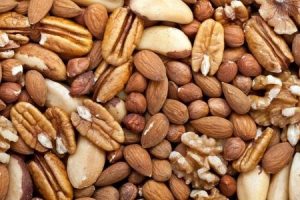Magnesium
Adult human bodies contain about 24 grams of magnesium. Magnesium plays a vital role in multiple physiologic processes and therefore it is a vital component in a healthy diet. It is absorbed through the gastrointestinal tract (gut), with more absorbed when the internal content is lower. Magnesium also appears to facilitate calcium absorption.
Spices, nuts, cereals, coffee, cocoa, tea, and vegetables are rich sources of magnesium. Leafy vegetables, as well as grains and nuts, generally have higher magnesium content than meats and dairy products.
No adverse effects have been associated with taking magnesium as a naturally occurring substance in foods. However, adverse effects have been seen with excessive magnesium intake as a consequence of the use of various magnesium salts for pharmacological/medicinal purposes. The primary manifestation of excessive ingestion of magnesium from non-food sources is diarrhoea, which is reversible and thus stops when you stop taking the magnesium.
Side effects of increased magnesium intake are not common because the body removes excess amounts.
Interaction with other drugs
Some antibiotics, called aminoglycosides, can affect the muscles. Magnesium can also affect the muscles, so taking these antibiotics and magnesium might cause muscle problems.
Magnesium might decrease how much antibiotic the body absorbs. Taking magnesium along with some antibiotics might decrease the effectiveness of some antibiotics. To avoid this interaction these antibiotics should be taken at least 2 hours before, or 4 to 6 hours after, magnesium supplements.
Magnesium might decrease blood pressure. Taking magnesium with medication for high blood pressure might cause your blood pressure to go too low, also known as hypotension.
Magnesium seems to help relax muscles. Taking magnesium along with muscle relaxants can increase the risk of side effects of muscle relaxants.
Use for migraine
Studies have shown that migraineurs have low brain magnesium during migraine attacks (1) and may also suffer from magnesium deficiency (2, 3). Furthermore, magnesium deficiency may play a particularly important role in menstrual migraine (4). Two controlled trials have shown that oral magnesium supplementation (taking in by mouth) is effective in headache prevention (5, 6). A third study (7) was negative, but this result has been attributed to the use of a poorly absorbed magnesium salt, as diarrhoea occurred in almost half of patients in the treatment group. In general, the published trials yielded mixed results, with favourable effects reported for acute treatment of patients with aura and possibly also menstrual migraine prevention. Magnesium’s efficacy may depend on a “high dose” supplementation (over 600mg) for a minimum of 3 to 4 months to achieve any benefit from preventative therapy.







1 Comment
Jess Lyons
Because I feel bad that you keep getting migraines! 🙁